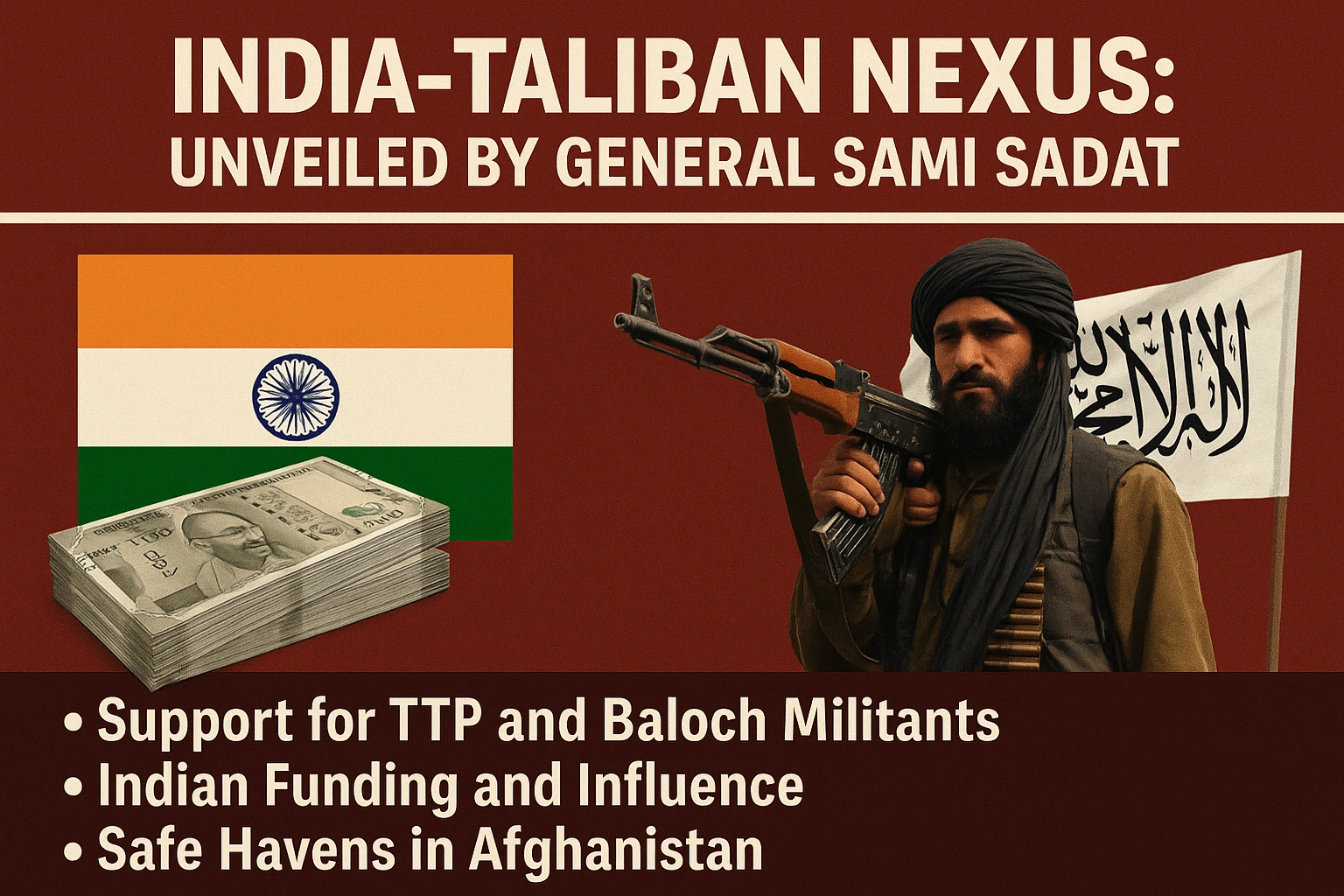Prologue
Former Afghan general Sami Sadat has recently made new revelations in Islamabad and in the rest of the world about a new and dangerous geopolitical partnership: India-Taliban nexus. In a statement that has rocked the diplomatic and intelligence frats, Sadat avowed the fact that Taliban, funded by India, is assisting Tehrik-i-Taliban Pakistan (TTP) and Baloch separatist militants in planning attacks against Pakistan. This follows a dangerous upsurge of the regional situation. Thereby, Pakistan now facing greater asymmetric risks and the fears of increasing the arc of instability in South Asia.
The Revelation: The Discovery of The Secret Partnership by General Sadat:
What is most worrying about what General Sadat has revealed is that it is so clear and believable. Having worked at a high level in the Afghanistan military force, Sadat has a lot to say about the inner processes of Taliban government and its external relations. His declaration that the Indian funding is being routed through the Taliban to militant groups active against Pakistan blows the smokescreen of plausible deniability over the Indian covert activities in the region.
The statements made by Sadat confirm, first-hand, the claim made by the Pakistani security agencies over the whole decade. This is primarily that India was using Afghan soil to proxy in a war against Pakistan. The world community neglected these allegations either through indifference or diplomatic silence over several years now. However, no one can afford to turn a blind eye against the way New Delhi has been exploiting militants to destabilize the region, in involvement with Taliban elements, spared of Sadat testimony.
The Exploitation of Afghanistan by India
Pakistan has a decades-long claim that India has a way of setting up of an intricate network consisting of intelligence assets, training camps and propaganda facilities in Afghanistan. Likewise, especially the presence of the U.S. in the nation. Even though the regime of Taliban in 2021 resulted in the end of the pro-India government in Kabul, the influence of India still did not dissolve; it further acquired a more secretive, sinister nature. In addition to this, the intelligence sources also confirm that out of the non-formal diplomatic leverage that India has been having, it has been forging allies with Taliban remnants. This is basically warlord groups in response to their provision of logistical assistance with the country of Pakistan.
Validation of the Long-standing Concerns of Islamabad
Afghan territory being used as a haven against Pakistan terrorism has been cited severally by the Defense Minister of Pakistan Khawaja Asif and different heads of ISI. Such assertions were regularly dubbed as rhetoric of regional rivalry. Yet with the leaking of evidence by General Sadat, Pakistan has now legitimate grounds to its story. Pakistan has lost much of its security forces and civilians due to use of the Afghan territory by hostile forces such as the TTP and Baloch insurgents, thus creating unstable conditions in the country.
Terrorists and Recycled American Weapons
One of the most troubling tendencies that come along with this nexus is the application of advanced weapons by TTP militants — which most of them are left behind by the fleeing U.S. troops during their ignominious retreat. This weaponry has been inherited by the Taliban which has sold or dispersed it to proxy players. Various attacks prove that TTP combatants use American-made M4 carbines, night vision devices, and sophisticated communication devices.
Marriage between Indian finance and American weaponry on the territories of Taliban rule is a dangerous combination. By that means promoting an insurgency of distances and firepower previously unknown.
Operation Bases and Safe Havens within Afghanistan
As it has done many times since the fall of Kabul, Pakistan has asked the Taliban to demolish TTP bases in the east of Afghanistan, with little success. Despite such commitments given by the Taliban leadership under the Doha Agreement, as well as at bilateral meetings, the Taliban leadership has been either blind or in fact has enabled TTP presence. The sanctuaries act as operational bases of planning at cross-border attacks and trafficking of weapons and human beings.
Furthermore, the tendency of Taliban to present the appearance of legitimacy on the international front, and training radical factions in the country, makes it a hypocritical player of the regional politics. This hypocrisy acts as a weapon of war in collaboration with the Indians using their financial, as well as tactical oversight strategy on Pakistan.
The Geopolitics of the Situation
The new factor of an India-Taliban nexus puts an Iranian-American-like spin on South Asian geo-politics and poses a new threat. Not only this increases the internal security problems of Pakistan, but it also poses the danger of loss of fragile peace along the Durand Line. With the support of foreign sponsors, equipped with modern weaponries, TTP and Baloch militants have now gained the capacity to organize high-impact attacks on strategic infrastructure, military objects, and civilian groups.
Moreover, this nexus erodes the efforts by the regional and global actors to counter terrorism on a broader scale. The self-proclaimed sufferers of terrorism, India, is now being accused of supporting terrorism by indirect associations. Consequently, this is a big ethical and diplomatic question.
Emergency International Intercession
With the wisdom of the revelations made by Sadat, the international organizations such as the United Nations, ought to carry out independent investigation into state-sponsored terrorism arising out of the Afghan soil. It is the moral duty of the U.S. that dominated the process of arming and influencing the dynamics of Afghan military to make sure that the remnant of its military arsenal does not become the means of damaging its neighbours like Pakistan.
In addition, pressure should be put on the Taliban to cut off the linkage with the TTP and end its terror organization. At the same time, India will have to take responsibility of its undeclared involvements and hypocrisy in the matter of terrorism.
India-Taliban nexus, as revealed by General Sami Sadat, is a dangerous development of the security architecture of South Asia. India with the help of some of the Taliban elements is financing, arming and assisting terror groups such as TTP and Baloch militants to create a hybrid warfare against Pakistan. Through this, the situation has led Pakistan to being in a precarious situation. This secret liaison is becoming the source of complex security framework in which Pakistan needs to ensure internal reinforcement and dynamic international relations.
The contest of the world must take steps. The normalization of such terrorism supported by a state will have a dangerous precedent, not only in Pakistan but also globally in the war against extremism.







